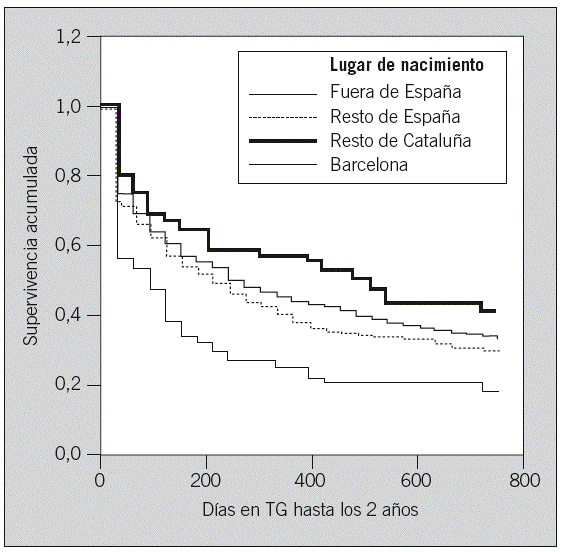Journal Information
Vol. 126. Issue 7.
Pages 250-252 (February 2006)
Vol. 126. Issue 7.
Pages 250-252 (February 2006)
DOI: 10.1157/13085284
Alcoholismo e inmigración. Adherencia de los pacientes inmigrantes a la terapia grupal
Alcolism and immigration. Adherence of immigrant patients to group therapy
Visits
2153
This item has received
Article information
Fundamento y objetivo: El número de extranjeros aumenta en España y con ello el acceso a los servicios sanitarios y los tratamientos por el alcohol. La terapia grupal (TG) es un elemento básico en el tratamiento de la dependencia alcohólica en todo el mundo, que, para su buen funcionamiento, requiere cohesión grupal. La homogeneidad es un factor importante para esta cohesión. En este estudio se valora si la TG tiene la misma eficacia en los pacientes inmigrantes que en los nativos. Pacientes y método: Las 1.856 primeras indicaciones consecutivas de TG para pacientes alcohólicos se han seguido hasta el alta o el abandono prematuro del tratamiento. Se compara el tiempo en tratamiento y tipo de abandono en función del lugar de nacimiento. Resultados: Finalizan la TG el 31% de los pacientes nacidos en Barcelona, el 39% de los nacidos en Cataluña, el 27% de España y el 14,5% de los nacidos en el extranjero (20% en Europa, 4% en América y ninguno de los nacidos en África [p = 0,02]). La probabilidad media de mantenerse en la TG es, respectivamente, de 351, 412, 320 y 212 días (p = 0,000). Discusión: Los pacientes nacidos fuera de España tienen pocas posibilidades de vincularse a una TG, y la abandonan con mayor frecuencia y más rápido que los otros pacientes. La mala adherencia de los pacientes procedentes de Sudamérica descarta que la causa sea idiomática. La mejor adherencia de los europeos y su mayor edad sugiere que la explicación del abandono de la TG tiene que ver con la baja integración social y los objetivos personales a corto plazo.
Palabras clave:
Alcoholismo
Psicoterapia grupal
Grupos étnicos
Emigración e inmigración
Rechazo terapéutico
Bacground and objective: Group therapy (GT) is considered a cornerstone in the treatment of alcohol dependence. Increasing numbers of foreigners are accessing alcohol treatment facilities, but efficacy of TG in those patients has not been studied. This work focuses on the influence of ethnicity and language in the compliance of GT. Patients and method: 1856 consecutive patients who were referred to GT for alcohol dependence were followed until discharge or dropout. Time on treatment and final endpoint were compared according to place of birth. Results: 31% of patients born in Barcelona, 39% born in Catalonia, 27% from the rest of Spain and 14.5% of foreigners (20% from Europe, 4% from America and none born in Africa (p = 0.02) completed successfully GT. The probability to stay in GT was 351, 412, 320 and 212 days (p = 0.000), respectively Discussion: Patients born abroad have lower chances to complete GT successfully, presenting with higher dropout rates and shorter treatments. The low compliance found in South American patients (who share a common language) and the better compliance found in Europeans (who are also a bit older) suggest that dropout is probably more related to social integration than to language problems.
Keywords:
Alcoholism
Group psychotherapy
Ethnic groups
Emigration and immigration
Treatment refusal
These are the options to access the full texts of the publication Medicina Clínica
Subscriber
Subscribe
Purchase
Contact
Phone for subscriptions and reporting of errors
From Monday to Friday from 9 a.m. to 6 p.m. (GMT + 1) except for the months of July and August which will be from 9 a.m. to 3 p.m.
Calls from Spain
932 415 960
Calls from outside Spain
+34 932 415 960
E-mail








